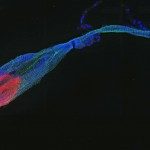Link to Pubmed [PMID] – 21752110
Mol. Microbiol. 2011 Sep;81(5):1343-57
Transmission of Plasmodium species from a mammalian host to the mosquito vector requires the uptake, during an infected blood meal, of gametocytes, the precursor cells of the gametes. Relatively little is known about the molecular mechanisms involved in the developmental switch from asexual development to sexual differentiation or the maturation and survival of gametocytes. Here, we show that a gene coding for a novel putative transporter, NPT1, plays a crucial role in the development of Plasmodium berghei gametocytes. Parasites lacking NPT1 are severely compromised in the production of gametocytes and the rare gametocytes produced are unable to differentiate into fertile gametes. This is the earliest block in gametocytogenesis obtained by reverse genetics and the first to demonstrate the role of a protein with a putative transport function in sexual development. These results and the high degree of conservation of NPT1 in Plasmodium species suggest that this protein could be an attractive target for the development of novel drugs to block the spread of malaria.

